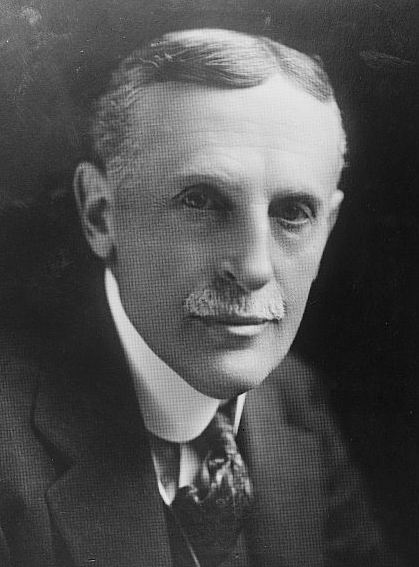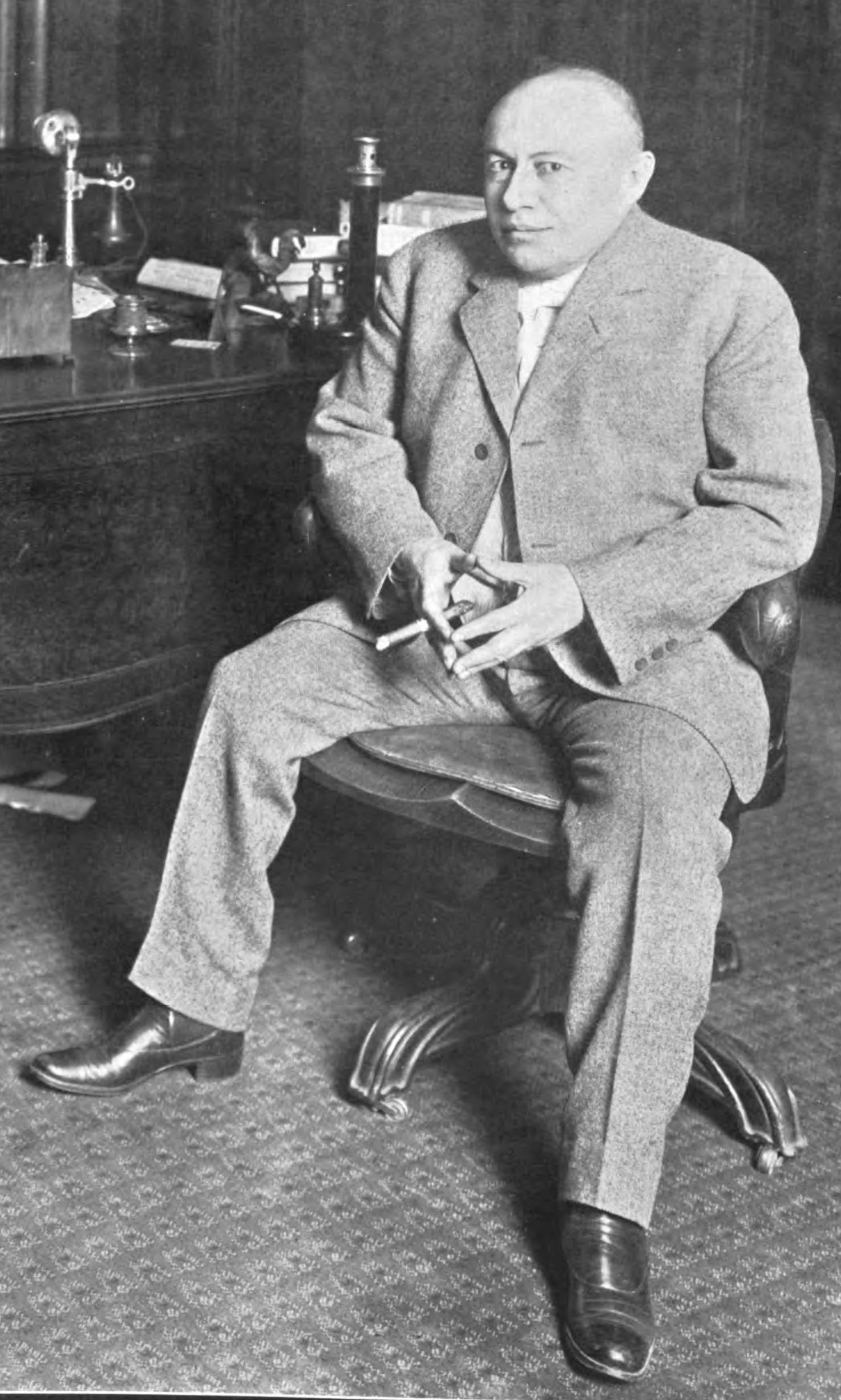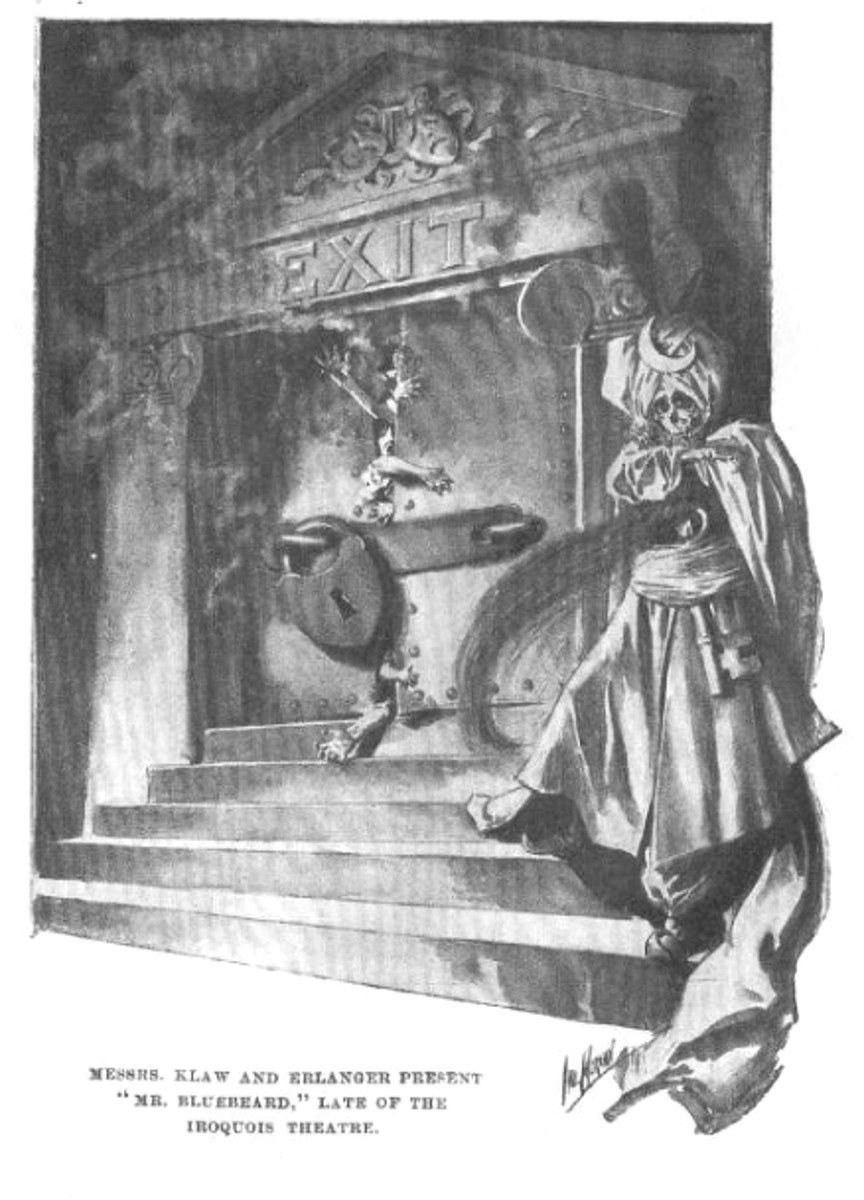Klaw And Erlanger on:
[Wikipedia]
[Google]
[Amazon]
 Klaw and Erlanger was an entertainment management and production partnership of Marc Klaw and Abraham Lincoln Erlanger based in New York City from 1888 through 1919. While running their own considerable and multi-faceted theatrical businesses on Broadway, they were key figures in the Theatrical Syndicate, the lucrative booking monopoly for first-class legitimate theaters nationwide.
Klaw and Erlanger joined in partnership in 1888. Starting from the purchase of an existing booking agency, the partners gradually gained control of the southern territory, anchored in New Orleans. They ran allied businesses, produced Broadway shows, and owned a number of theaters. They were part owners of the new
Klaw and Erlanger was an entertainment management and production partnership of Marc Klaw and Abraham Lincoln Erlanger based in New York City from 1888 through 1919. While running their own considerable and multi-faceted theatrical businesses on Broadway, they were key figures in the Theatrical Syndicate, the lucrative booking monopoly for first-class legitimate theaters nationwide.
Klaw and Erlanger joined in partnership in 1888. Starting from the purchase of an existing booking agency, the partners gradually gained control of the southern territory, anchored in New Orleans. They ran allied businesses, produced Broadway shows, and owned a number of theaters. They were part owners of the new
 All the members of the Theatrical Syndicate brought in geographic territories, sections of a national, networked chain of theaters in the United States. The strength of Klaw and Erlanger came from its dominance in the south.
Marc Klaw (1858-1936) was born in
All the members of the Theatrical Syndicate brought in geographic territories, sections of a national, networked chain of theaters in the United States. The strength of Klaw and Erlanger came from its dominance in the south.
Marc Klaw (1858-1936) was born in  As partners Klaw & Erlanger remained involved—dominant—in the affairs of the Theatrical Syndicate after its peak.
As partners Klaw & Erlanger remained involved—dominant—in the affairs of the Theatrical Syndicate after its peak.
 The
The
 The partners became founding parties to the Theatrical Syndicate in 1896. The other members were
The partners became founding parties to the Theatrical Syndicate in 1896. The other members were 
 Klaw and Erlanger was an entertainment management and production partnership of Marc Klaw and Abraham Lincoln Erlanger based in New York City from 1888 through 1919. While running their own considerable and multi-faceted theatrical businesses on Broadway, they were key figures in the Theatrical Syndicate, the lucrative booking monopoly for first-class legitimate theaters nationwide.
Klaw and Erlanger joined in partnership in 1888. Starting from the purchase of an existing booking agency, the partners gradually gained control of the southern territory, anchored in New Orleans. They ran allied businesses, produced Broadway shows, and owned a number of theaters. They were part owners of the new
Klaw and Erlanger was an entertainment management and production partnership of Marc Klaw and Abraham Lincoln Erlanger based in New York City from 1888 through 1919. While running their own considerable and multi-faceted theatrical businesses on Broadway, they were key figures in the Theatrical Syndicate, the lucrative booking monopoly for first-class legitimate theaters nationwide.
Klaw and Erlanger joined in partnership in 1888. Starting from the purchase of an existing booking agency, the partners gradually gained control of the southern territory, anchored in New Orleans. They ran allied businesses, produced Broadway shows, and owned a number of theaters. They were part owners of the new Iroquois Theater
The Iroquois Theatre fire occurred on December 30, 1903, at the Iroquois Theatre in Chicago, Illinois, United States. It is the deadliest theater fire and the deadliest single-building fire in U.S. history, resulting in at least 602 deaths.
Thea ...
in Chicago, which suffered a catastrophic fire in 1903 that resulted in more than 600 deaths and brought Klaw & Erlanger bitter criticism. In the same year they opened their flagship New Amsterdam Theater
The New Amsterdam Theatre is a Broadway theater on 214 West 42nd Street, at the southern end of Times Square, in the Theater District of Manhattan in New York City. One of the oldest surviving Broadway venues, the New Amsterdam was built from ...
in New York, where the Aerial Gardens became the longtime stage for the Ziegfeld Follies
The ''Ziegfeld Follies'' was a series of elaborate theatrical revue productions on Broadway in New York City from 1907 to 1931, with renewals in 1934 and 1936. They became a radio program in 1932 and 1936 as ''The Ziegfeld Follies of the Ai ...
.
From 1896, Klaw and Erlanger joined with others to form the Theatrical Syndicate which held an effective monopoly
A monopoly (from Greek el, μόνος, mónos, single, alone, label=none and el, πωλεῖν, pōleîn, to sell, label=none), as described by Irving Fisher, is a market with the "absence of competition", creating a situation where a speci ...
over the booking of stage performers into first-class legitimate theaters across the United States. Its control of the theater market was brief. As the Syndicate attempted to bring vaudeville from its "lowbrow associations by presenting only the finest, class acts", pressure from the independent Shubert family
The Shubert family was responsible for the establishment of the Broadway district, in New York City, as the hub of the theater industry in the United States. They dominated the legitimate theater and vaudeville in the first half of the 20th cen ...
and accusations of trust building forced the Syndicate to lose much of its market power in 1910. After 1910, Klaw and Erlanger continued to play a role in the syndicate, which still sparred with the Shuberts for market share for years. Klaw and Erlanger also ran their own productions, experimented with vaudeville, and embarked on film production from 1913 to 1916. They dissolved their partnership in 1919, remaining independently active afterward.
The partners
 All the members of the Theatrical Syndicate brought in geographic territories, sections of a national, networked chain of theaters in the United States. The strength of Klaw and Erlanger came from its dominance in the south.
Marc Klaw (1858-1936) was born in
All the members of the Theatrical Syndicate brought in geographic territories, sections of a national, networked chain of theaters in the United States. The strength of Klaw and Erlanger came from its dominance in the south.
Marc Klaw (1858-1936) was born in Paducah, Kentucky
Paducah ( ) is a home rule-class city in and the county seat of McCracken County, Kentucky. The largest city in the Jackson Purchase region, it is located at the confluence of the Tennessee and the Ohio rivers, halfway between St. Louis, Miss ...
in 1858. He received his law degree from Louisville Law School and practiced law while maintaining a role within the theater industry as a part-time critic.
A. L. Erlanger (1860-1930) came from Cleveland, beginning as treasurer of the Euclid Avenue Opera House. In his 20s Erlanger worked for Joseph Jefferson and others as business manager for touring theater companies. He was known for his bullish personality.
After a meeting in San Antonio, in 1888 Klaw teamed with Erlanger to purchase the former H.S. Taylor Theatrical Exchange in New York. Through Klaw's personal contacts with theater owners, they expanded it to assert control over southern touring routes, but with operational control and a major theatrical presence in New York City. The partners also ran a number of allied subsidiary businesses, including the "Klaw and Erlanger Opera Company", "Klaw and Erlanger's Costume Company", and a construction company.
Erlanger throughout his career was known for underwriting shows such as ''The Great Metropolis'' (1889) and producing large numbers such as Pink Lady (1911) and ''Honeymoon Lane'' (1926). The partners produced the first ''Ziegfeld Follies
The ''Ziegfeld Follies'' was a series of elaborate theatrical revue productions on Broadway in New York City from 1907 to 1931, with renewals in 1934 and 1936. They became a radio program in 1932 and 1936 as ''The Ziegfeld Follies of the Ai ...
'' in 1907 at the rooftop " Jardin de Paris" in New York City.
 As partners Klaw & Erlanger remained involved—dominant—in the affairs of the Theatrical Syndicate after its peak.
As partners Klaw & Erlanger remained involved—dominant—in the affairs of the Theatrical Syndicate after its peak.
Theaters
Klaw and Erlanger's own operations encompassed running the Syndicate's booking operations for over 500 theaters across the country, regular Broadway productions, direct ownership of a number of houses in New York and New Orleans, and the occasional commissioning of entirely new theaters. The most lavish of these was the flagshipNew Amsterdam Theatre
The New Amsterdam Theatre is a Broadway theater on 214 West 42nd Street, at the southern end of Times Square, in the Theater District of Manhattan in New York City. One of the oldest surviving Broadway venues, the New Amsterdam was built fro ...
, opened October 23, 1903. The architects were Herts & Tallant
Henry Beaumont Herts (January 23, 1871 – March 27, 1933) was an American architect.
Herts was born in New York City, attended Columbia University without graduating, and apprenticed under Bruce Price. He studied architecture in Europe at th ...
, working in a hard-to-classify fin-de-sciele style, with integrated sculpture and murals from artists the caliber of George Grey Barnard
George Grey Barnard (May 24, 1863 – April 24, 1938), often written George Gray Barnard, was an American sculptor who trained in Paris. He is especially noted for his heroic sized '' Struggle of the Two Natures in Man'' at the Metropolitan Museu ...
and Roland Hinton Perry. The New Amsterdam featured the largest playhouse on Broadway
Broadway may refer to:
Theatre
* Broadway Theatre (disambiguation)
* Broadway theatre, theatrical productions in professional theatres near Broadway, Manhattan, New York City, U.S.
** Broadway (Manhattan), the street
**Broadway Theatre (53rd Stree ...
(1,702 seats), new office headquarters for the firm, and, in a prompt expansion upward a year later, creation of the Aerial Gardens rooftop theater with its notorious see-through staircase, home of the Ziegfeld Follies
The ''Ziegfeld Follies'' was a series of elaborate theatrical revue productions on Broadway in New York City from 1907 to 1931, with renewals in 1934 and 1936. They became a radio program in 1932 and 1936 as ''The Ziegfeld Follies of the Ai ...
from 1913 through 1920. Designer and architect Joseph Urban
Joseph Urban (May 26, 1872 – July 10, 1933) was an Austrian-American architect, illustrator, and scenic designer.
Life and career
Joseph Urban was born on May 26, 1872, in Vienna. He received his first architectural commission at age 19 wh ...
became the scenic designer for the ''Follies'' shows at the New Amsterdam starting in 1915.
 The
The Iroquois Theater
The Iroquois Theatre fire occurred on December 30, 1903, at the Iroquois Theatre in Chicago, Illinois, United States. It is the deadliest theater fire and the deadliest single-building fire in U.S. history, resulting in at least 602 deaths.
Thea ...
in Chicago opened weeks later, in November, after a rushed construction schedule. The new theater burned during a holiday matinee on December 30, 1903, with the loss of more than 600 lives, among the worst fires in American history. The Iroquois fire brought intense criticism to Klaw and Erlanger. The team retained the brilliant Chicago attorney Levy Mayer
Levy Mayer (October 23, 1858 – August 14, 1922) was an American lawyer from Virginia. A child prodigy of law, Mayer graduated from Yale Law School before he could even legally practice the profession in his hometown of Chicago, Illinois. Afte ...
to defend against the resulting wave of criminal and civil litigation. Most prominent among its critics in the press was James Metcalfe, drama critic and editor of the old Life magazine, whose attacks on Klaw & Erlanger persisted for years and ranged into ugly anti-Semitic caricature. Metcalfe's "special vendetta against the syndicate" led to the January 1904 publication of a cartoon showing a skeleton, costumed as Bluebeard, guarding the padlocked door of a theater exit, with the caption "Messrs. Klaw and Erlanger Present Mr. Bluebeard, Late of the Iroquois Theater." For that, Klaw & Erlanger presented Life with its first libel suit, for $100,000 in damages. After considering that the partners had owned 25% of the Iroquois, managed its bookings, and had owned the production of "Mr. Bluebeard," the jury dismissed their libel suit after five minutes' deliberation.
Other KE theaters in New York included the Gaiety Theatre, the Liberty Theatre
The Liberty Theatre is a former Broadway theater at 234 West 42nd Street in the Theater District of Midtown Manhattan in New York City. Opened in 1904, the theater was designed by Herts & Tallant and built for Klaw and Erlanger, the partnersh ...
, and the New York Theatre. In New Orleans the partners owned and operated the Tulane and the Crescent.
The Syndicate
 The partners became founding parties to the Theatrical Syndicate in 1896. The other members were
The partners became founding parties to the Theatrical Syndicate in 1896. The other members were Charles Frohman
Charles Frohman (July 15, 1856 – May 7, 1915) was an American theater manager and producer, who discovered and promoted many stars of the American stage. Notably, he produced ''Peter Pan'', both in London and the US, the latter production ...
, J. Fred Zimmerman Sr., Samuel F. Nixon and Al Hayman
Al Hayman, also known as Raphael Hayman, (1847 – February 10, 1917) was the business partner of the better-known Charles Frohman who together with others established the Theatrical Syndicate. In addition to the financial backing, ownership an ...
. Another loosely associated figure was William Harris William or Will or Willie Harris may refer to:
Politicians and political activists
*William Harris (born 1504) (1504–?), MP for Newport, Cornwall
*William Harris (died 1556), MP for Maldon (UK Parliament constituency), Maldon
*William Harris (MP ...
of Rich & Harris in Boston. Taking advantage of their physical chain of theaters, the syndicate developed a standardized booking process, and brought efficiency to an otherwise fragmented and wasteful scheduling system.
The system was opposed—by their main competitors, the Shubert brothers
The Shubert family was responsible for the establishment of the Broadway district, in New York City, as the hub of the theater industry in the United States. They dominated the legitimate theater and vaudeville in the first half of the 20th cen ...
. Sam Shubert began to compete through the billing of "independent theater," an appeal that soon broke the Syndicates' playhouse monopoly and began the diversification of Broadway theater. But the Klaw & Erlanger booking system was also decried and challenged by performers such as the prominent actor Richard Mansfield
Richard Mansfield (24 May 1857 – 30 August 1907) was an English actor-manager best known for his performances in Shakespeare plays, Gilbert and Sullivan operas, and the play '' Dr. Jekyll and Mr. Hyde''.
Life and career
Mansfield was born ...
, the husband-and-wife team of Harrison Grey Fiske
Harrison Grey Fiske (July 30, 1861 – September 2, 1942) was an American journalist, playwright and Broadway producer who fought against the monopoly of the Theatrical Syndicate, a management company that dominated American stage bookings ...
and Minnie Maddern Fiske
Minnie Maddern Fiske (born Marie Augusta Davey; December 19, 1865 – February 15, 1932), but often billed simply as Mrs. Fiske, was one of the leading American actresses of the late 19th and early 20th century. She also spearheaded the fig ...
, among many others.
Its monopoly was broken in 1910, but the Theatrical Syndicate continued in operation with considerable holdings. As late as October 1924—after the partners' brief foray into the film business circa 1915, after Marc Klaw ended his partnership with Erlanger in 1919 and opened his own Klaw Theatre
The Klaw Theatre was a Broadway theatre located at 251–257 West 45th Street (now a part of George Abbott Way) in Midtown Manhattan. Built in 1921 for producer Marcus Klaw, the theater was designed by Eugene De Rosa. Rachel Crothers' '' Nice ...
on Broadway in 1921—A.L. Erlanger was still reported as the most powerful member of the Theatrical Syndicate. In fact, poised to take over the complete operation and its multifaceted benefits:
:''Mr. Erlanger, who was the most powerful member of the anti-unionists, has wearied of conducting the famous Theatrical Syndicate without assistance while dividing the profits with the heirs and assigns of the other original members; so, he has arranged the matter in such fashion that hereafter he, himself, will be all there is of the Syndicate... The combination took life in 1896...with a view of avoiding conflict and confusion, fixing responsibility for broken engagements and disregarded contracts, and incidentally of determining the drawing-power and consequent sharing-terms of plays and starts. The scheme, Mr. Erlanger long ago told me, originated not with him, but with the late Al Hayman...''
A.L. Erlanger died in 1930.

Vaudeville productions
Klaw & Erlanger were primarily producers for legitimate theaters, as opposed to vaudeville. Vaudeville had its own parallel chains of theaters, and its own dominant booking monopoly in the east, called the United Booking Office, run by E.F. Albee—set up in 1900 in conscious emulation of the Theatrical Syndicate. The partners did cross over into the vaudeville business territory occasionally. The biggest foray was in April 1907, in concert with none other than Lee and J.J. Shubert. Together they established a new vaudeville booking operation called the United States Amusement Company, promising "Advanced Vaudeville", reportedly capitalized with $100 million. The Shuberts had hoped to fill up their oversupply of theater seats. The motivations of Klaw & Erlanger became clear seven months later when they and the Shuberts sold out the entire operation to Albee in November. Albee also paid a bonus fee $250,000 for the promise to stay out of vaudeville for another ten years.Notes
{{Authority control American theatre managers and producers Former monopolies Vaudeville producers Silent film producers